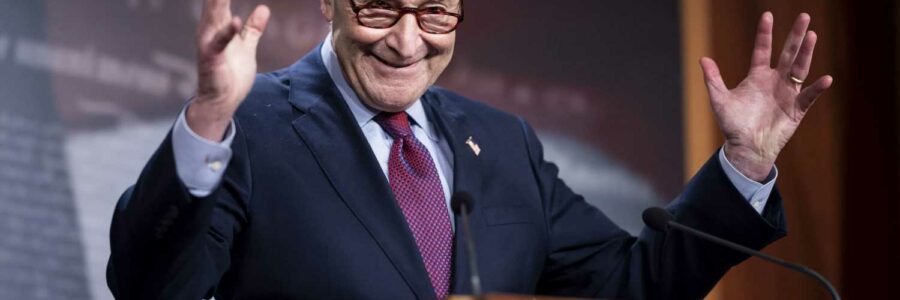
Senate set to pass $1 trillion bipartisan infrastructure bill as Democrats move ahead with economic plan
- The Senate is expected to pass a $1 trillion bipartisan infrastructure bill Tuesday as Democrats move ahead with their economic agenda.
- The chamber will next move to pass a budget resolution that would allow Democrats to approve their $3.5 trillion spending bill without Republican votes.
- The House is waiting to take up either plan until the Senate approves both.
The Senate is set to pass a $1 trillion bipartisan infrastructure plan Tuesday, a huge step for Democrats as they try to push President Joe Biden's sweeping economic agenda through Congress.
The legislation, which includes $550 billion in new funding for transportation, broadband and utilities, is expected to get through with Democratic and Republican votes. After its passage, Senate Majority Leader Chuck Schumer, D-N.Y., plans to turn to a budget resolution that would allow Democrats to approve what they see as a complementary $3.5 trillion spending plan without Republican votes.
"After all the long, hard negotiating, the stops and starts, we're here and it's a good thing, a very good thing for America," Schumer said Monday night ahead of the final vote.
The chamber is expected to vote on the bill's passage at about 11 a.m. ET.
House Speaker Nancy Pelosi, D-Calif., has stressed she will not take up the infrastructure bill or Democrats' separate proposal to expand the social safety net until the Senate passes both of them. The House does not return from its current recess until Sept. 20.
The bill's passage will cap a months long slog for the White House and both parties in Congress to forge a plan to refresh American roads, railways, public transit, water systems, power grids and broadband. Congress for years failed to agree on a comprehensive infrastructure plan, which supporters in both parties say will boost the economy and create jobs.
"It's long-term spending to repair and replace and build assets that will last for decades. In doing so, it does make life better for people," Sen. Rob Portman, an Ohio Republican and the bill's lead GOP negotiator, said Monday.
CNBC Politics
Read more of CNBC's politics coverage:
- Democrats leave debt ceiling increase out of budget plan, setting Congress up for fall showdown
- Senators have a deal on the crypto amendment, and Treasury won’t oppose it
- Cuomo accuser Brittany Commisso says New York governor needs counseling, was 'sexually aggressive'
Democrats' push to pass their economic agenda could still fall apart. The infrastructure bill on its own appears to have enough Democratic and Republican support to coast through the House.
But to win over both centrists wary of a $3.5 trillion bill and progressives who want additional spending on child care, paid leave and climate policy, Pelosi has said she will not pass one bill without the other. In order to approve their plan through budget reconciliation without Republicans, Democrats cannot lose a single member of their 50-person Senate caucus, or more than a handful of representatives.
The Senate will next vote on a budget resolution in the coming days to unlock the reconciliation process. Schumer said Monday that the chamber will "immediately" vote on proceeding to the budget measure after finishing the infrastructure bill.
He expects to start a so-called vote-a-rama — where the Senate considers an indefinite number of amendments to the resolution — "shortly thereafter." The chamber plans to start its own recess once it passes the budget measure.
Centrists including Sens. Joe Manchin, D-W.V., and Kyrsten Sinema, D-Ariz., have signaled they will vote for the budget resolution but try to trim the $3.5 trillion proposal. Republicans have started to hammer Democrats for the proposed spending and individual tax increases they hope to use to offset it.
Biden and Democrats want a signature policy they can promote on the midterm campaign trail next year as they try to hold both chambers of Congress. Their plan is set to extend household tax credits and health-care subsidies passed during the coronavirus pandemic, lower the Medicare eligibility age and expand benefits and use tax credits, rebates and polluter fees to encourage the adoption of green energy.
The bipartisan bill is the first step. It puts $110 billion into roads, bridges and other major projects, $66 billion into passenger and freight rail, $65 billion into broadband, $55 billion into water systems and $39 billion into public transit, among other spending.
The Biden administration has pushed for its swift passage.
"My department is ready the moment this bill becomes law to start deploying these resources and getting them out to communities," Transportation Secretary Pete Buttigieg told CNBC's "The News With Shepard Smith" on Monday.
Funding for the bill will come from repurposed coronavirus relief money, unused federal unemployment insurance aid and spectrum auctions, among other sources. Republicans resisted Biden's proposal to hike the corporate tax rate to offset costs.
While senators have said the bill will be paid for, the nonpartisan Congressional Budget Office estimated Thursday that it would increase budget deficits by $256 billion over a decade. The report did not include the potential revenue boost from economic growth.
This story is developing. Please check back for updates.
Subscribe to CNBC on YouTube.
Source: Read Full Article